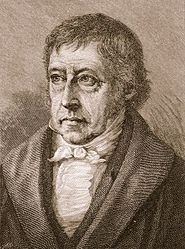This article includes a list of references, related reading, or external links, but its sources remain unclear because it lacks inline citations. (September 2010) |
 |
| Hegelianism |
|---|
| Forerunners |
| Principal works |
| Schools |
| Related topics |
| Related categories |
Absolute idealism is chiefly associated with Friedrich Schelling and G. W. F. Hegel, both of whom were German idealist philosophers in the 19th century. The label has also been attached to others such as Josiah Royce, an American philosopher who was greatly influenced by Hegel's work, and the British idealists.[1][2]
According to Hegel, being is ultimately comprehensible only as an all-inclusive whole (das Absolute). Hegel asserted that in order for the thinking subject (human reason or consciousness) to be able to know its object (the world) at all, there must be in some sense an identity of thought and being. Otherwise, the subject would never have access to the object and we would have no certainty about any of our knowledge of the world.
The absolute idealist position dominated philosophy in nineteenth-century Britain and Germany, while exerting significantly less influence in the United States. The absolute idealist position should be distinguished from the subjective idealism of Berkeley, the transcendental idealism of Kant, or the post-Kantian transcendental idealism (also known as "critical idealism")[3] of Fichte and of the early Schelling.[4][clarification needed]
- ^ "Absolute Idealism". Britannica.com. October 30, 2018.
- ^ The term absoluter Idealismus occurs for the first time in Schelling's Ideen zu einer Philosophie der Natur als Einleitung in das Studium dieser Wissenschaft (Ideas for a Philosophy of Nature: as Introduction to the Study of this Science), Vol. 1, P. Krüll, 1803 [1797], p. 80.
- ^ Frederick C. Beiser, German Idealism: The Struggle Against Subjectivism, 1781-1801, Harvard University Press, 2002, p. 3.
- ^ Nectarios G. Limnatis, German Idealism and the Problem of Knowledge: Kant, Fichte, Schelling, and Hegel, Springer, 2008, pp. 138, 166, 177.